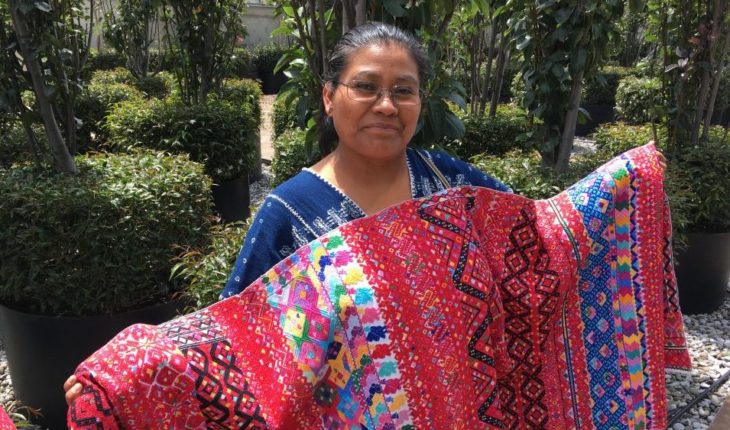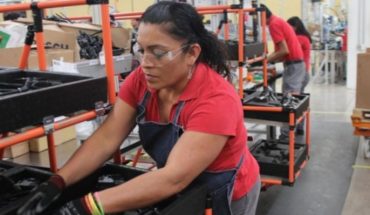Rosalinda Sántiz refused to follow the future almost tax for the women of San Andrés Larráinzar, a region in the Highlands of Chiapas. Very young knew that he wanted to study rather than marry and have children, but to do so he had to leave their community just fulfilling the majority of age and without speaking Spanish. After years of effort, in 2015 could graduate as a degree in rural development planning, at the age of 37.
He also always had very clear that this knowledge should transmit it to the women of their community and little by little it has succeeded through the cooperative that brings together 250 women weavers and as President of the education and training organization for women Kinal Antsetik (Cefocam) and in the network of cooperatives of South (Recosur), which integrates with other cooperatives in Chiapas, Quintana Roo, Yucatan, Oaxaca and Guerrero.
The first attempt to organize was to convince women who should assess their own work. Many of them, by necessity, sold their creations for little money, despite the fact that its tissues are made on backstrap loom, and each piece was unique. The second thing was to get women to take their own decisions. Attend meetings of the cooperative, even if their husbands do not approve it, or decide on what to spend the money they earn and not let their husbands.
Now, after decades of activism, women in the region are reaching another rung. They will prepare a strategy to defend against plagiarism which marks International have been made on their tissues through the first meeting of artisans, in defence of our designs, from 7 to 10 September, involving organizations of Chiapas, Guerrero, Yucatán, Quintana Roo, Michoacán, Central and South America.
It is, explains, Rosalinda, “defence of the cultural heritage of our ancestral knowledge, the heritage of our peoples” and to do this, first you have to reflect and analyze the problem.
Defense against plagiarism of agreement with the Organization impact, at least eight brands of clothing, including international as Zara or Mango, plagiarized designs of indigenous communities of Oaxaca, Chiapas and Hidalgo, between 2012 and 2017.
Despite public denunciation, Zara redid it with a blouse of the community of Aguacatenango, Chiapas, last July.
Faced with this panorama, the artisans need to think about the problem because “if we don’t recognize our work between us, we will not have conscience to defend our fabrics and will come a time when going to print and will find in any store “our designs, will be losing consciousness and we are not going to be able to sell our products”, says Rosalind.
Why is that at the meeting they will include topics such as “what do mean as cultural heritage, intellectual property” and, above all, “what think to defend our skills as artisans”. To respond to the questions also needed allies, including civil servants because “you have to make a fight altogether”.
Among the guests is Eréndira Cruz Villegas, Director of the Fourth Office of native peoples of the NHRC; Aída Castillejas González, technical Secretary of the National Institute of anthropology and history; Carlos Martínez Negrete, teaching and research and the Senator Susana Harp Iturribarría.
At the end of the meeting they intend to establish a route for the defense of their crafts and stop plagiarism by brands and designers who abuse the weavers because “those who win are companies”.
Another goal for the community is to complete its investigation into the origin and meaning of their tissues because it has slowly been losing. Therefore, Magdalena, one of the most skilled weavers made a sample with 80 designs, but still include most, and especially, to investigate the meanings. They also want to do a book with this investigation, as another attempt to preserve the heritage of their ancestors.
The road to the women’s Liberation the cooperative of women of Chiapas began in 1984 only to sell their products, but was gradually transformed into a point of political activism, participating in marches and organizing workshops on human rights, even before the 1994 uprising of the Zapatista Army of national liberation (EZLN).
Since women organize training workshops for the rest of women, so that they know their rights, with the great complexity that the language tzotzil doesn’t even exist that Word.
In addition, awareness about the value of their work as weavers, the most palpable impact is on the ground gained by women rights to combat domestic violence.
“The violence is so naturalized thinks that this is the life. It is very difficult to make understand to women that they should not. It is very difficult because you raised as well and so you look at life,”says Rosalinda.
In addition to workshops, the way they found was to make “home visits”. Explain to the men that violence is not normal, that it recognized the value of women in the House and at work. A group of women in the cooperative went to the houses of the other and explained the couple “the importance of women to participate in their own cooperative, in the meetings, be representative”.
They also got that women could decide what to do with the money that they earn in the tissues and not give it to her husband. “Women already manage their own money. Now they share expenses”, said Rosalinda, who has observed the changes in the last 18 years.
Rosalinda is 40 years old and ensures that the work of the women who began the cooperative in the 1980s was determinant to make it also is activist, that philosophy among them “is that we ourselves have to accompany the other women convey to others what you have learned.”
Activism also made her dare to leave home at age 18 to study outside the community high school and fulfill his dream. “What I always wanted to since the age of 14, finished it in 2015 as a degree in Rural Development”, says.





